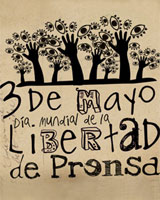UNESCO Office in Quito celebrates World Press Freedom Day
05-05-2009 (Quito)

© UNESCO
Freedom of the press in the Andean countries was the topic of a conference organized by the UNESCO Office in Quito, in cooperation with the Latin American Faculty of Social Science (FLACSO). The conference, which took place on 28 April at FLACSO campus, gathered representatives of the media, governmental bodies, academia and civil society to discuss new threats and opportunities for freedom of the press in Latin America.
Given the current tension between the media and some governments in the region, the panel was followed by a lively debate. The drafting of a new communications law in Ecuador, the on-going revision of license granting mechanisms and practices and the citizens’ loss of confidence in the media were some of the issues discussed with the audience.
The conference was just one of several activities undertaken by the UNESCO Quito Office within the framework of worldwide actions to commemorate World Press Freedom Day.
To conduct awareness activities for young people about the importance of freedom of expression and the press in democratic societies, the Quito Office also developed educational packets for secondary schools in the Andean countries. Educational exercises with corresponding teacher guides and background materials were distributed to 1000 high schools in the region with the assistance of National Commissions for UNESCO.
A press kit was also prepared for the major media outlets and partners in the region. It included a press release, as well as an analysis paper that explored the situation of press freedom in Latin America and particularly in the Andean countries. The kit also presented the translated Spanish edition of UNESCO’s publication, Media Development Indicators: A Framework for Assessing Media Development. Three hundred copies were sent to the print and electronic media in the Andean countries and distributed through the National Commissions.
To promote public awareness about the challenges and importance of the free press, the Quito Office prepared a supplement insert for the Sunday edition (3 May) of El Comercio, one of the leading national newspapers in Ecuador. The eight-page insert, which circulated in more than 25,000 copies to the newspaper’s subscribers, contained an analysis of press freedom in Latin America, information on the World Press Freedom Prize and the message from the Director-General of UNESCO on World Press Freedom Day. Other contributors included the United Nations Development Fund for Women (UNIFEM), the High Commission for Human Rights in Ecuador, as well as prominent media figures.
The Director of UNESCO’s Quito Office, Edouard Matoko, appeared in the TV show Ecuavisa on World Press Freedom Day. The TV spot aimed to raise awareness on the importance of the press freedom and to articulate the positive role that media can play in mutual understanding and dialogue.
The conference was just one of several activities undertaken by the UNESCO Quito Office within the framework of worldwide actions to commemorate World Press Freedom Day.
To conduct awareness activities for young people about the importance of freedom of expression and the press in democratic societies, the Quito Office also developed educational packets for secondary schools in the Andean countries. Educational exercises with corresponding teacher guides and background materials were distributed to 1000 high schools in the region with the assistance of National Commissions for UNESCO.
A press kit was also prepared for the major media outlets and partners in the region. It included a press release, as well as an analysis paper that explored the situation of press freedom in Latin America and particularly in the Andean countries. The kit also presented the translated Spanish edition of UNESCO’s publication, Media Development Indicators: A Framework for Assessing Media Development. Three hundred copies were sent to the print and electronic media in the Andean countries and distributed through the National Commissions.
To promote public awareness about the challenges and importance of the free press, the Quito Office prepared a supplement insert for the Sunday edition (3 May) of El Comercio, one of the leading national newspapers in Ecuador. The eight-page insert, which circulated in more than 25,000 copies to the newspaper’s subscribers, contained an analysis of press freedom in Latin America, information on the World Press Freedom Prize and the message from the Director-General of UNESCO on World Press Freedom Day. Other contributors included the United Nations Development Fund for Women (UNIFEM), the High Commission for Human Rights in Ecuador, as well as prominent media figures.
The Director of UNESCO’s Quito Office, Edouard Matoko, appeared in the TV show Ecuavisa on World Press Freedom Day. The TV spot aimed to raise awareness on the importance of the press freedom and to articulate the positive role that media can play in mutual understanding and dialogue.
Related themes/countries
· Ecuador
· World Press Freedom Day 2009
· Press Freedom: News Archives 2009
Share this story:
Contact information
- UNESCO
Source
- UNESCO Office in Quito (in Spanish)
Field office














